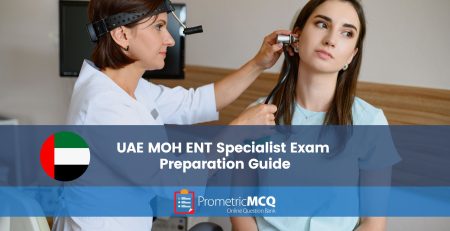
MOH Prometric Family Medicine Exam: Tips and Strategies
Webmaster2024-04-20T17:35:00+00:00Are you ready to conquer the Prometric Family Medicine Exam with confidence and precision? Imagine mastering the exam effortlessly, armed with the best tips and strategies at your disposal. The journey to success begins with thorough preparation and strategic study techniques that set you apart from the competition. Aspiring candidates like you understand the importance of excelling in the Family Medicine Prometric Exam and are seeking guidance to navigate the challenges effectively.
In our comprehensive guide, we unlock the secrets to acing the MOH Exam in Family Medicine. Dive into a treasure trove of study materials, exam-taking strategies, and practice questions meticulously curated to enhance your performance. Elevate your preparation with insights into the exam structure, valuable tips to optimize your study routine, and mock exams to assess your readiness. Join the ranks of successful medical professionals who have harnessed the power of expert guidance to fulfill their career aspirations.
Table of Contents
ToggleIntroduction to the MOH Prometric Family Medicine Exam
The MOH Exam for Family Medicine is a crucial step in the journey towards becoming a certified professional in this field. Designed to assess the knowledge and skills required to practice as a family medicine specialist, this exam holds great significance for aspiring candidates. It serves as a benchmark to evaluate their expertise in diagnosing and managing a wide range of medical conditions that commonly occur in the primary care setting.
The exam consists of multiple-choice questions (MCQs) that cover various aspects of family medicine, including patient care, disease prevention, and health promotion. It evaluates candidates’ ability to apply medical knowledge, make clinical decisions, and effectively communicate with patients. Successful completion of this exam demonstrates a high level of competency and ensures that certified professionals are well-equipped to provide comprehensive care to individuals and families.
By passing the MOH Exam in Family Medicine, candidates can gain recognition for their dedication and competence in this specialized field. It opens up opportunities for career advancement, both in terms of clinical practice and academic pursuits. Aspiring family medicine specialists can leverage their success in the exam to secure positions in reputable healthcare institutions, contribute to research and education, and make a positive impact on the community they serve.
In the upcoming sections, we will delve deeper into the format and structure of the exam, explore effective study techniques, and provide valuable tips and strategies to enhance your preparation. Let’s embark on this journey together and equip ourselves with the knowledge and skills needed to excel in the MOH Exam in Family Medicine.
Understanding the MOH Prometric Family Medicine Exam Format and Structure
The Family Medicine Prometric Exam is designed to assess candidates’ knowledge, skills, and abilities in the field of family medicine. To perform well on this exam, it is crucial to have a clear understanding of its format and structure.
Number of Sections
The exam is divided into multiple sections, each focusing on different aspects of family medicine. These sections cover a wide range of topics, including diagnosis, treatment, management, and patient care. Familiarizing yourself with the number of sections will help you plan your study schedule accordingly and ensure comprehensive preparation.
Types of Questions
The Family Medicine Prometric Exam consists of various question formats that test candidates’ knowledge and problem-solving abilities. These question types may include multiple-choice questions, short-answer questions, and clinical case scenarios. It is important to familiarize yourself with each question type and practice solving them to improve your performance.
Time Allocation
Proper time management is crucial during the exam. Candidates are allocated a specific amount of time to complete each section. Understanding the time allocated for each section will enable you to plan your exam strategy effectively. Be sure to allocate sufficient time to answer each question accurately and leave some buffer time for reviewing any marked questions.
It is recommended to practice time management during your preparation by solving practice questions within the allocated time frame. This will help you develop a sense of pacing and improve your ability to complete the exam within the given time limits.
Having a clear understanding of the exam format and structure is essential for your success in the Family Medicine Prometric Exam. By knowing the number of sections, types of questions, and time allocation, you can strategize your study plan and approach the exam with confidence.
Remember to make use of reliable study resources, such as textbooks, online materials, and practice questions, to supplement your preparation and reinforce your understanding of the exam format and structure.
Keep in mind that thorough and focused studying, combined with effective time management, will greatly increase your chances of achieving a high score on the Prometric Family Medicine Exam. Good luck with your preparation!
Study Techniques and Resources
When preparing for the MOH Exam in Family Medicine, it is crucial to employ effective study techniques and utilize the right resources. By adopting these strategies, you can optimize your learning experience and enhance your chances of success. Here are some valuable tips to help you make the most of your study sessions:
- Organize your study materials: Start by creating a study plan and organizing your resources. Gather textbooks, lecture notes, and any other relevant materials to ensure you have everything you need in one place.
- Utilize online resources: Take advantage of the wealth of online resources available for studying Prometric Family Medicine Exam. Online platforms, medical websites, and educational apps offer a variety of materials, including videos, interactive quizzes, and case studies.
- Practice with sample questions: Familiarize yourself with the exam format and types of questions by practicing with sample questions. Look for mock exams or question banks specifically designed for the MOH Exam in Family Medicine.
- Join study groups or forums: Connect with fellow exam candidates through study groups or online forums. This not only allows you to discuss concepts and clarify doubts but also provides moral support and motivation.
- Stay organized and track progress: Maintain a study schedule and set specific goals for each study session. Regularly assess your progress to identify areas that need more focus and improvement.
- Take breaks and practice self-care: Break your study sessions into manageable chunks and include short breaks. Taking care of your physical and mental well-being is essential for retaining information and maintaining focus.
Remember, everyone has their own unique learning style, so experiment with different techniques to find what works best for you. Stay consistent, be proactive, and adapt your study approach as needed. With the right techniques and resources, you can optimize your preparation for the MOH Prometric Family Medicine Exam.
Prometric Family Medicine Exam study materials, Prometric Family Medicine exam practice questions, online resources for family medicine exam
Exam-Taking Strategies
When it comes to excelling in the Prometric Family Medicine Exam, having effective exam-taking strategies is crucial. By implementing the right approaches, you can confidently tackle different question types, manage your time efficiently, and minimize test anxiety. Here are some valuable tips to help you navigate the exam successfully:
Understand the Question Types
Familiarize yourself with the different question types you may encounter in the exam, such as multiple-choice questions (MCQs), case-based questions, and fill-in-the-blank questions. Understanding the format will allow you to approach each question with the appropriate strategy.
Read Carefully and Analyze
Take your time to read the questions and options carefully. Pay attention to keywords, such as “not” or “except,” which can significantly impact the answer. Analyze the given information, identify key points, and establish a clear understanding of what the question is asking.
Manage Your Time Wisely
With a limited time frame, time management is crucial. Allocate a specific amount of time for each section or question, and stick to it. If you encounter a challenging question, make a note to revisit it later, ensuring you don’t get caught up and sacrifice time for easier questions.
Utilize Process of Elimination
When faced with multiple-choice questions, use the process of elimination to remove incorrect options. This strategy increases your chances of selecting the correct answer from the remaining choices. Cross out the options that are clearly incorrect or unrelated to the question.
Prioritize High-Yield Topics
During your preparation, identify high-yield topics and focus on mastering them. These areas are more likely to be tested extensively, so dedicating more time and effort to understanding and retaining the information will improve your overall performance.
Stay Calm and Manage Test Anxiety
Test anxiety can negatively impact your performance. Utilize relaxation techniques, such as deep breathing and positive affirmations, to calm your mind. Trust in your preparation and remind yourself of your capabilities. Maintaining a positive mindset can enhance your focus and boost your confidence during the exam.
Remember, applying these exam-taking strategies will not only help you perform your best but also reduce unnecessary stress. By approaching each question confidently, managing your time effectively, and staying calm, you can increase your chances of success in the Family Medicine Prometric Exam.
Key Topics and Focus Areas
To excel in the Prometric Family Medicine Exam, it’s crucial to have a clear understanding of the key topics and focus areas. By prioritizing these topics in your preparation, you can ensure comprehensive coverage of the exam content. Here are the important areas to focus on:
1. Preventive Care and Health Maintenance
- Guidelines for routine screenings and immunizations
- Recommendations for preventive health interventions
- Strategies for promoting healthy lifestyles and disease prevention
2. Acute and Chronic Diseases
- Diagnosis and management of common acute illnesses, such as respiratory infections, gastrointestinal disorders, and musculoskeletal conditions
- Strategies for managing chronic diseases like diabetes, hypertension, and asthma
- Understanding treatment guidelines, medication options, and monitoring parameters
3. Primary Care Skills
- Comprehensive history-taking and physical examination techniques
- Differential diagnosis and formulating management plans
- Communication skills for patient education and shared decision-making
4. Psychosocial Issues in Primary Care
- Assessing and managing mental health disorders, including depression, anxiety, and substance abuse
- Addressing social determinants of health and advocating for patients’ well-being
- Implementing strategies for health promotion and disease prevention within various populations
5. Women’s Health and Maternity Care
- Routine gynecological care and screening
- Managing conditions related to menstrual irregularities, contraception, and menopause
- Prenatal care, labor management, and postpartum care
6. Pediatric Care
- Growth and development monitoring
- Diagnosis and management of common pediatric conditions, including respiratory infections, gastroenteritis, and allergic disorders
- Immunization schedules and vaccination recommendations
7. Geriatric Care
- Assessing and managing common geriatric syndromes, such as polypharmacy, falls, and cognitive impairment
- Understanding age-related changes and their impact on healthcare decision-making
- Palliative and end-of-life care considerations
8. Evidence-Based Medicine and Research
- Critical appraisal of medical literature
- Interpreting study designs and statistical analyses
- Incorporating evidence-based guidelines into clinical practice
9. Medical Ethics, Laws, and Professionalism
- Ethical principles in the provision of patient care
- Legal obligations, including documentation and confidentiality
- Promoting patient autonomy and advocating for equitable healthcare access
By focusing on these key topics and dedicating adequate time to their study and understanding, you can enhance your preparation for the Prometric Family Medicine Exam. Remember to consult authoritative sources and refer to up-to-date guidelines and research to ensure the accuracy and reliability of your knowledge.
Stay tuned for the next section, where we will provide a set of practice questions and guidance on how to use them effectively for self-assessment and improvement.
Practice Questions and Mock Exams
Preparing for the MOH Exam in Family Medicine requires more than just studying the material; it also requires practice and self-assessment. In this section, we will provide a set of practice questions and offer guidance on how to effectively use them to assess your knowledge and improve your performance.
Importance of Practice
Practice questions play a crucial role in exam preparation as they allow you to familiarize yourself with the format, style, and content of the actual Family Medicine Prometric Exam. By practicing with these questions, you will gain confidence, identify areas of weakness, and refine your test-taking strategies.
Using Practice Questions Effectively
To make the most out of your practice sessions, consider the following tips:
1. Start Early and Be Consistent
Begin practicing with sample questions early in your preparation. Consistency is key, so aim to incorporate practice sessions into your study routine regularly. This approach will help you gradually build your knowledge and reinforce key concepts.
2. Simulate Exam Conditions
When practicing, create an environment similar to the actual exam. Find a quiet place, set a timer to match the allotted time for each section, and avoid distractions. By simulating exam conditions, you can train yourself to stay focused and manage your time effectively.
3. Analyze Your Performance
After completing a set of practice questions, carefully review your answers. Identify the areas where you performed well and those that require improvement. Understand the reasons behind incorrect answers and seek additional resources to reinforce your understanding.
4. Seek Feedback and Guidance
If possible, consider joining study groups or forums where you can discuss questions and solutions with fellow candidates. Sharing insights and learning from others can provide valuable perspectives and enhance your preparation.
5. Gradually Increase Difficulty
As you progress in your preparation, challenge yourself with more difficult practice questions. This will help strengthen your knowledge and problem-solving skills, preparing you to handle a wide range of questions in the actual exam.
Additional Resources
In addition to practice questions, various online platforms and educational resources offer mock exams specifically tailored to the Prometric Family Medicine Exam. These mock exams closely simulate the actual test and expose you to a broader range of questions. Consider integrating these resources into your preparation to further enhance your exam readiness.
Remember, the purpose of practice questions is not only to assess your knowledge but also to identify areas for improvement. Utilize these resources strategically, learn from your mistakes, and continually refine your approach. Through dedicated practice and self-assessment, you can boost your confidence and improve your performance on the MOH Exam in Family Medicine.
Tips for Review and Revision
When it comes to reviewing and revising for the MOH Exam in Family Medicine, it’s crucial to have a solid strategy in place. Here are some effective techniques that can help you make the most of your review sessions and boost your chances of success:
1. Create a Study Schedule:
Develop a study schedule that allows for regular review sessions. Set aside dedicated time each day or week to focus on specific topics or areas of weakness. This will help ensure that you cover all the necessary material and avoid last-minute cramming.
2. Utilize Flashcards:
Flashcards are a great tool for reviewing key concepts and information. Create flashcards for important topics, including clinical guidelines, diagnostic criteria, and treatment approaches. Use them to test your knowledge and reinforce your understanding.
3. Practice with Mock Exams:
Take advantage of practice questions and mock exams to simulate the actual exam environment. This will help you familiarize yourself with the question format and assess your readiness. Analyze your performance to identify areas that require further review.
4. Seek Peer or Mentor Feedback:
Engage in study groups or seek feedback from peers or mentors who are knowledgeable in family medicine. Discuss key topics, share insights, and clarify any doubts or misconceptions. This collaborative approach can enhance your understanding of concepts and offer different perspectives.
5. Focus on Weak Areas:
Identify your weak areas and allocate additional time for their review. Use textbooks, online resources, and review materials specific to those topics. Deepen your understanding, clarify any doubts, and practice questions related to those areas.
6. Practice Time Management:
During your review sessions, practice answering questions within the allocated time frame. This will help you develop effective time management skills and reduce the chances of feeling rushed during the actual exam.
Remember, effective review and revision require consistency, discipline, and a thorough understanding of the material. By following these techniques, you can optimize your preparation and increase your confidence going into the MOH Exam in Family Medicine.
Additional Resources and Support
Finding additional resources and support can greatly enhance your preparation for the MOH Exam in Family Medicine. Here are some valuable options to consider:
- Online Forums and Communities: Joining online forums and communities dedicated to Family Medicine exam preparation can provide a wealth of knowledge and support.
- Textbooks and Study Guides: Utilize recommended textbooks and study guides specifically tailored for the Family Medicine Prometric Exam. Titles like “The Complete Guide to Family Medicine Prometric Exam” and “MOH Family Medicine Prep: Tips and Practice Questions” can provide comprehensive coverage of the exam content and offer helpful tips for success.
- Live Classes and Webinars: Consider enrolling in live classes or webinars conducted by experienced instructors and medical professionals.
- Practice Exam Sets and Mock Tests: Enhance your exam readiness by accessing practice sets and mock tests specifically designed for the Family Medicine Prometric Exam. Websites like [Prometric Exam MCQ Practice Set](www.prometricmcq.com) offer comprehensive question banks with timed exams that simulate the real testing environment.
Remember, incorporating a variety of resources and seeking support from experienced professionals and fellow candidates can immensely benefit your preparation journey. Take advantage of these additional resources that align with your learning style and preferences. Good luck with your studies and the upcoming exam!
FAQs
Here are some frequently asked questions about the MOH Exam in Family Medicine:
The MOH (Ministry of Health) Exam in Family Medicine is a standardized assessment designed to evaluate the knowledge and competence of medical professionals in the field of family medicine. It is an essential requirement for individuals seeking to practice as general practitioners or specialists in family medicine.
The MOH Exam in Family Medicine holds significant importance as it serves as a benchmark to assess the proficiency and expertise of medical professionals in providing comprehensive healthcare services to individuals and families. It plays a crucial role in determining their eligibility to practice in this field.
The Prometric Family Medicine Exam consists of multiple-choice questions (MCQs) that assess the candidate’s knowledge and understanding of various topics related to family medicine. The exam is divided into sections, with a specific number of questions and allocated time for each section.
To effectively prepare for the MOH Exam in Family Medicine, it is crucial to utilize a combination of study techniques and resources. These may include textbooks, online resources, practice questions, and mock exams. Creating a structured study plan and dedicating sufficient time for revision will enhance your preparation.
Yes, there are several additional resources and support options available to aid in your preparation for the MOH Exam in Family Medicine. Online forums, support groups, and educational websites offer valuable insights and resources that can complement your study materials and provide a platform for discussion and clarification of doubts.
Remember, thorough preparation and utilizing the right resources will greatly enhance your chances of success in the MOH Exam in Family Medicine.
Apply for UAE MOH License
Get UAE MOH Prometric Exam Preparation and Licensing Services










